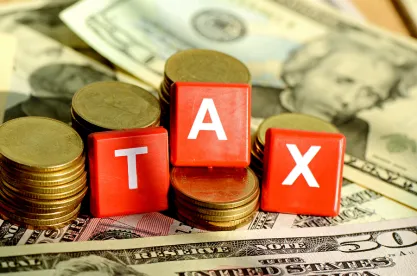House Republican Tax Bill Imposes Excise Tax on Wealthy Private Universities and Excess Compensation of Highly Paid Employees; Subjects State Pension Plans to UBTI Rules
On Thursday, November 2, House Republicans led by Speaker Paul Brady (R-WI) and Chairman of the House Ways & Means Committee Kevin Brady (R-TX), released the first public draft of the much-anticipated Tax Cuts and Jobs Act (the “bill”). (Our full coverage of the bill can be found here.)
In addition to providing substantial rate cuts for corporations and many pass-through businesses and repealing the estate tax, the 429-page document contains several provisions of interest to public charities and private foundations (as well as their advisors).
Increase in Standard Deduction and Phase Out of the Estate Tax.
The bill would increase the exemption from estate tax from $5.6 million to $11.2 million and would repeal the estate tax entirely beginning in 2024. Repeal of the estate tax may significantly reduce amounts of charitable bequests by very wealthy individuals.
Additionally, the bill nearly doubles the size of the standard deduction to $12,000 for single individuals and $24,000 for married couples filing jointly. The increased standard deduction is likely to reduce the number of taxpayers that itemize deductions and may decrease tax incentives to make deductible contributions to charity.
Increase in the AGI Limitation for Cash Donations to Public Charities; substantiation requirements.
The current cap on deductibility of cash contributions to section 501(c)(3) organizations at 50% of a taxpayer’s adjusted gross income (AGI) would be increased to 60% of a taxpayer’s AGI. However, taxpayers would no longer be able to deduct any portion of amounts paid for rights to purchase tickets for seating at college athletic events. (Under current law, taxpayers may deduct 80% of amounts paid for seating rights as charitable contributions.)
Substantiation of contributions reported by donee organizations. Currently, taxpayers claiming a charitable contribution deduction need to obtain and provide a contemporaneous written acknowledgement from the donee organization for contributions of $250 or more. Section 170(f)(8)(D) permitted taxpayers to rely on information reported by the donee organization to the IRS under regulations to be promulgated instead of obtaining a contemporaneous written acknowledgement. Regulations implementing this provision were proposed in 2015 but withdrawn in early 2016 after numerous objections. The Tax Court held in late 2016 that section 170(f)8)(D) was not self-executing; rather, regulations were required for deductibility under the provision. The bill would delete section 170(f)(8)(D), eliminating the possibility of future regulation on this topic.
Termination of private activity bonds.
The bill would end the exemption for interest income earned on private activity bonds issued by state and local governments after December 31, 2017. (Under current law, interest earned on private activity bonds is generally tax-exempt, but in some cases is taxable under the alternative minimum tax (AMT) rules. The proposed legislation repeals the AMT.) Qualified section 501(c)(3) bonds, which are a major source of funding for universities, hospitals, and cultural institutions, would no longer accrue tax-free interest. Professional sports stadiums could also not be financed using tax-free bonds. Bonds issued on or before December 31, 2017 would be grandfathered, and would continue to accrue tax-free interest, but could not be refunded (i.e., refinanced) with new tax-exempt bonds.
20-percent excise tax on excess compensation to employees of tax-exempt organizations.
Under current law, there is no absolute cap on the amount of compensation a tax-exempt organization may pay to its employees who are not “insiders” (i.e., “disqualified persons”), or on arm’s length compensation paid to insiders. If a transaction between a tax-exempt organization and a disqualified person (including an employee) is not at arm’s length, the disqualified person is subject to a 25% excise tax on the “excess benefit” received and the organization may be subject to a further 200% tax (or, in some circumstances, risk losing its tax exemption) if the excess benefit is not corrected.
Under the proposed legislation, compensation paid in excess of $1 million to any of an exempt organization’s covered employees, which are generally the organization’s five highest-paid employees, would be subject to a 20% excise tax payable by the organization. Compensation for this purpose would include all taxable remuneration, including cash and the value of non-cash property and benefits, and also payments from related persons and organizations, but would exclude payments to certain tax-advantaged retirement plans, such as Roth contributions.
The 20% excise tax to be paid by the organization would also apply to certain severance “parachute payments” that are paid to covered employees in excess of the employee’s “base amount” of compensation. “Parachute payments” are defined for this purpose as payments that are contingent upon the covered employee’s separation from the employer organization and have an aggregate present value that equals or exceeds three times the base amount. For this purpose, the “base amount” is determined by applying the current rules of section 280G, which generally provide that a covered employee’s base amount is the individual’s average annual taxable income from the organization over the five year period immediately preceding the year in which the separation from service occurs (or any shorter period of service with the organization if less than five years).
Under the bill, if an employee is a “covered employee” (i.e., one of the organizations five highest-paid employees) with respect to any year beginning after December 31, 2016, that employee is considered a “covered employee” with respect to the employer organization in all following tax years. The excise tax therefore would continue to apply to compensation in excess of $1 million paid to any covered employee (including a former employee) in subsequent tax years, even if not currently employed by the organization or no longer among its five highest paid employees.
As with the treatment of fringe benefits, discussed below, this provision appears to be an attempt to mirror the limitation on deductibility of compensation in excess of $1 million to certain employees of publicly traded corporations, proposed elsewhere in the same bill.
Modifications to the unrelated business income tax.
The value of disallowed deductions for certain fringe benefits to employees of exempt organizations would be treated as unrelated business taxable income. The bill disallows deductions for non-exempt employers for expenses associated with providing transportation fringe benefits, on-premise gyms and athletic facilities, and other entertainment or recreational benefits provided to employees. Because a tax-exempt employer is unaffected by a disallowed deduction, the bill would treat payment of these fringe benefit expenses as unrelated business taxable income (UBTI) of the tax-exempt organization.
Limitation on exclusion of research activities from UBTI. Under current law, income derived from research activities of certain hospitals and academic institutions is exempt if the institute is operated primarily for the purpose of conducting fundamental research that is made freely available to the public. Under the bill, this exclusion would apply only to income derived from the public and freely available fundamental research that is the operational purpose of the research institution (and not all research activities of the institution).
Dual-status governmental entities and state and local pension plans would be subject to tax on UBTI. Under the proposed legislation, all organizations that are exempt from tax under section 501(a), whether or not they are also exempt from tax under another Code provision, would be subject to tax on their UBTI . Currently, such treatment applies only to state and local colleges and universities Therefore, state and local entities which are tax-exempt not only under section 501(a) but also under section 115(1) as government entities would be subject to the same UBTI rules as other tax-exempt organizations not affiliated with state and local governments. This would include, for example, governmental pension plans and governmental hospitals that have obtained section 501(c)(3) determinations.
Excise tax on investment income of certain private colleges and universities.
Under the proposed legislation, tax-exempt private colleges and universities having at least 500 students and owning assets (excluding those assets used directly for purposes of educating students) with an aggregate fair market value equal to or exceeding $100,000 per student would be subject to a 1.4% excise tax on net investment income—the same rate that applies to private foundations under the bill. Depending on the definition of “student” and other factors, this provision may impact a large variety of both large and small institutions.
Changes to taxation of private foundations.
Excise tax on net investment income fixed at 1.4%. Under current law, an excise tax of 1% or 2% is imposed on the net investment income of private foundations. The bill would fix the rate for all private foundations at 1.4%.
Minimum hours open requirement for private operating foundations that operate art museums. Private operating foundations are currently exempt from the 30% excise tax generally imposed on the undistributed earnings of private foundations. Under the proposed bill, in addition to satisfying the income test and other requirements for private operating foundation status, an organization that operates an art museum would need to open the museum to the public during normal business hours for at least 1,000 hours during the tax year.
Exemption for certain independently operated, philanthropic holdings from the excess business holding tax. Under current law, a private foundation that owns 20% or more of the interests of one or more for-profit entities is subject to a 10% excess business holding tax on the value of these interests. If excess holdings arise other than from a purchase, the owner generally has five years to dispose of the excess holdings before being subject to the tax, although the IRS may extend this period an additional five years if the gift or bequest is unusually large (and the private foundation establishes certain facts and circumstances demonstrating that the extension is warranted).
The proposed legislation would exempt private foundations from this tax if certain conditions are met. First, the foundation must own all of the for-profit business’s voting stock and have acquired all of its interests in the for-profit business other than by purchasing it. Second, the for-profit business must distribute all of its net operating income for the tax year to the private foundation within 120 days of the close of that tax year. Finally, the for-profit business’s directors and executives cannot be substantial contributors to the private foundation or make up a majority of the private foundation’s board of directors. It has been reported that the proposal was designed to help Newman’s Own Foundation, the foundation organized by actor Paul Newman. In the absence of legislation, Newman’s Own Foundation would be required to sell most of its interest in the food company Newman’s Own, Inc. by 2018.
Qualified tuition reductions subject to tax.
Under current section 117(d), employees of schools are not subject to tax on the benefit of reduced tuition provided to themselves or their spouses and dependents, provided the institution’s tuition reduction program satisfies specific requirements. Under the proposed legislation, this discount, whether received in-kind or as an additional cash payment, would be taxable.
Political speech permitted during religious services.
A provision prohibiting charitable organizations exempt from tax under section 501(c)(3) from engaging in certain political campaign activities and speech (commonly known as the “Johnson amendment”) would be modified to permit limited political speech during religious services. We previously reported on an executive order to this effect here.
Under the proposed legislation, political content included as part of a homily, sermon, teaching, dialectic, or other presentation during a religious service or gathering would not put an organization’s tax exemption in jeopardy, so long as the preparation and presentation of the political speech (1) occurred in the ordinary course of the organization’s carrying out of its exempt purpose, and (2) resulted in no more than de minimis incremental costs being incurred by the organization. Because this provision applies only to religious organizations, it may raise issues under the Establishment Clause of the U.S. Constitution.
Reporting requirements for donor advised funds.
Under current law, donors may contribute to funds sponsored by section 501(c)(3) public charities and take a current deduction, even though the contributed funds are not used immediately by the organization. The bill would require sponsoring organizations of such “donor advised funds” to disclose annually to the IRS on their Forms 990 their policies on inactive donor advised funds (i.e., minimum frequency or level of distributions) as well as the average amount of grants made from such funds relative to the aggregate value of the funds’ assets during the tax year.
David Miller also contributed to this article.





 />i
/>i

